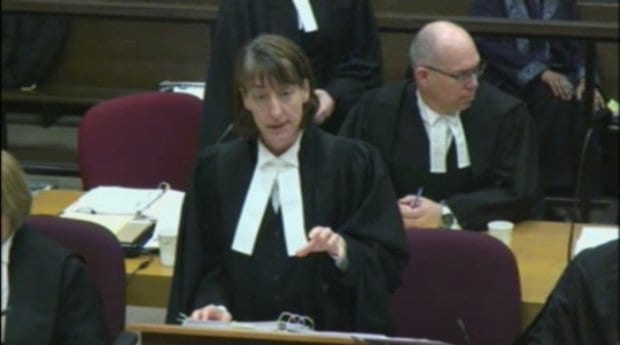Lawyers for the Nova Scotia Barristers’ Society (NSBS) struck back against Trinity Western University (TWU) in Nova Scotia Supreme Court, arguing that the NSBS council does have jurisdiction to block TWU law graduates from articling in Nova Scotia and that the society is constitutionally obligated to protect gay students from discrimination.
The judicial review into the NSBS’s decision not to recognize TWU’s prospective law students entered its third day Dec 18.
At the heart of the case is TWU’s community covenant, a document all students must sign that forbids sex outside of heterosexual marriage. The NSBS decided in April it would ban TWU students from its bar admission program unless the BC university dropped or changed the covenant. The university took the society to court, arguing that the ban amounts to religious discrimination.
After hearing from TWU’s lawyers and a number of Christian groups Dec 16 and 17, it was the NSBS’s turn to argue its case. All three NSBS lawyers told the court that the ban was not only within the society’s jurisdiction, but that it was constitutionally obligated and morally important to protect LGBT rights.
Marjorie Hickey told the court that the NSBS had “very broad regulation-making authority,” handed to it by the Nova Scotia legislature, and that the ban was well within the society’s mandate of regulating the legal profession. Peter Rogers addressed the balance of religious and sexual minority rights, stressing that if “even one LGB person is denied the opportunity to enter the profession because of the mandatory nature of the covenant, that’s a very serious issue.”
The star of the NSBS’s presentation, however, was the team’s junior lawyer, Jane O’Neill, who handled sharp questioning from Justice Jamie Campbell with poise. O’Neill spent much of her time shooting down the idea that dislike for gay marriage was a specially protected religious belief.
“My friend said that the evangelical belief that homosexual behaviour is immoral is a protected belief. We agree. But it’s no different than the belief in the superiority of the white race,” she said. “I don’t think we’d be here if the issue was ‘I want to have an all-white law school.’ Nobody would be asking the bar society to approve that,” O’Neill contended. “It’s something that the bar society cannot and will not do.”
She also took direct aim at the community covenant, saying TWU had to prove the covenant really protected some religious belief. “That religious belief, how is that infringed? By standing next to the person who may or may not be having sex with his husband?” she asked the court. “The most that can be said is that their ‘freedom of religion’ includes getting a recognized law degree from a law school where LGB students are not welcome. I don’t know any other way to articulate it.”
Justice Campbell jumped in frequently to critique the NSBS lawyers, even though he made it clear he found the TWU covenant baffling. He called it “odd” and “repugnant” while defending the university’s right to free speech. “Even if those beliefs are expressed in bizarre, 3,000-year-old language, they have the right to those beliefs,” he said.
Campbell was especially rough on Hickey’s suggestion that Nova Scotia human rights law could be applied to a university in British Columbia. “Who in Nova Scotia is being discriminated against?” he asked. “How is taking a student from TWU and allowing them to be an article clerk in Nova Scotia discrimination against all those people who have never thought of coming to Nova Scotia, let alone practising here?”
“It seems convoluted because it is,” he said.
The case casting the darkest shadow over the NSBS argument is Trinity Western University v British Columbia College of Teachers, a similar case in BC in which a judge decided there was no proof that teachers produced by TWU would be bigoted or cause harm in the classroom. O’Neill argued that this case is different because the NSBS is trying to sanction the university itself, not individual lawyers.
“We’re not telling them what they can or can’t do; we’re telling them what we can’t or won’t do,” she said.
The case is expected to conclude Dec 19.
Whether the Nova Scotia decision will matter at all hinges on TWU’s accreditation as a law school in BC. Earlier in December, BC’s minister of advanced education pulled his approval of the law school after an Oct 31 vote by the Law Society of British Columbia.
Meanwhile, TWU announced Dec 18 that it would sue the law society for reversing its approval.
Xtra is following this development.


 Why you can trust Xtra
Why you can trust Xtra


